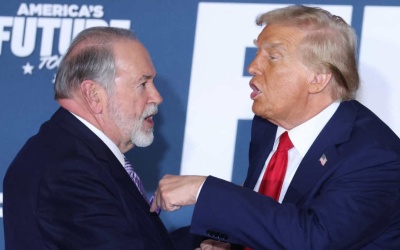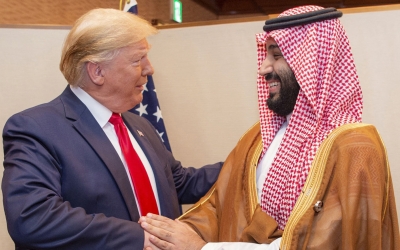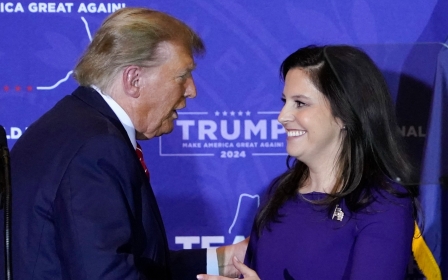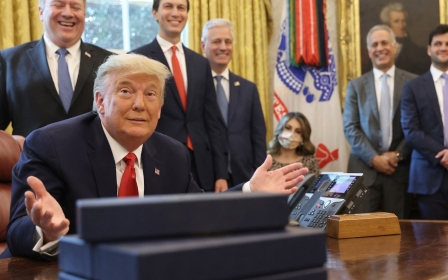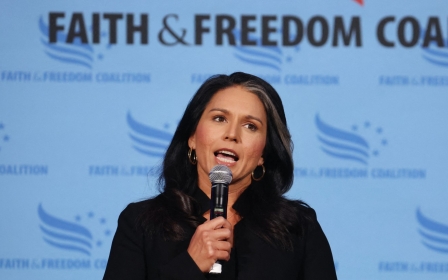US elections 2024: Who's in Donald Trump's cabinet and who's on the shortlist?
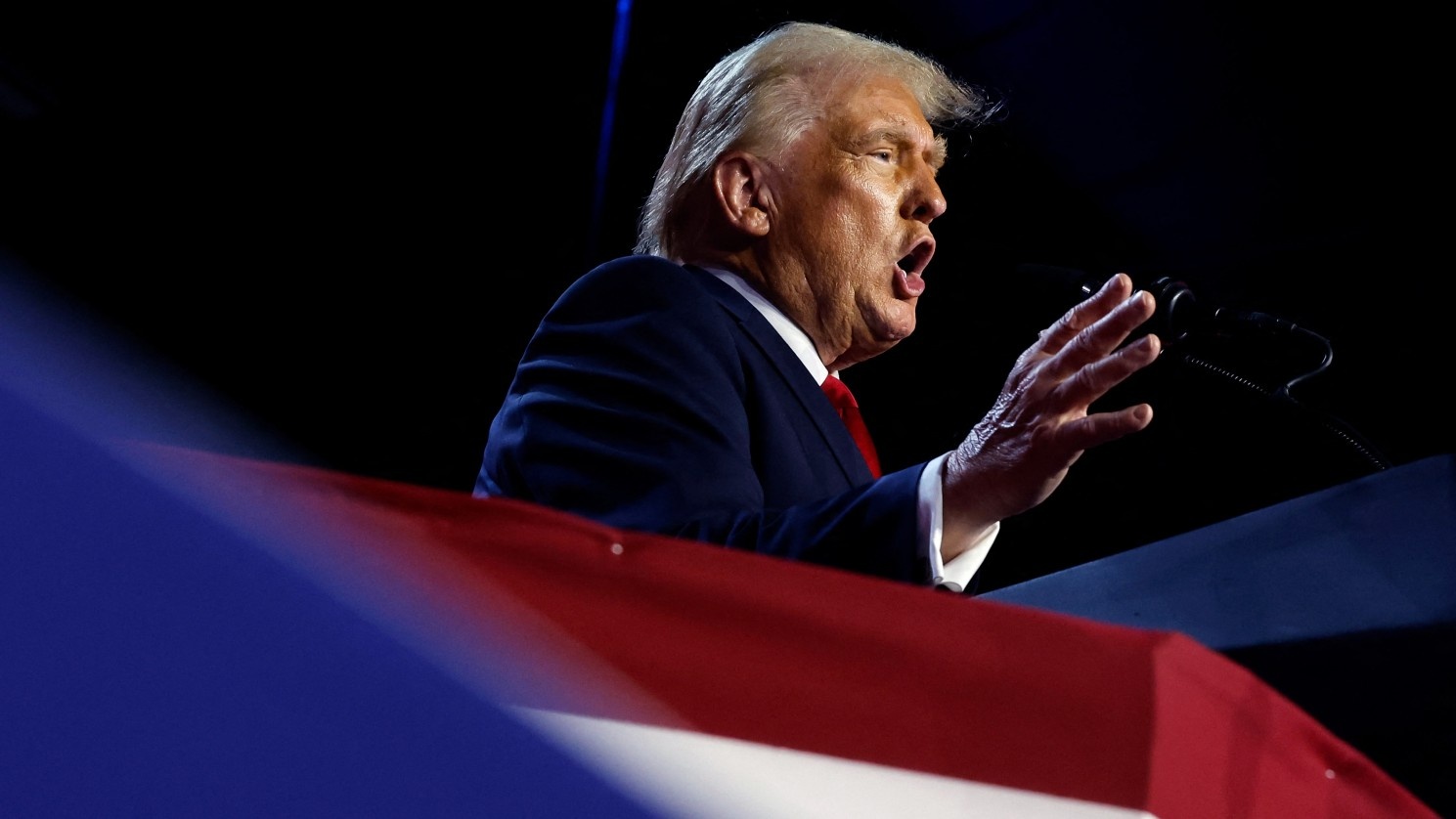
US President-elect Donald Trump has drawn a stark line between who he considers allies and those he sees as enemies.
On the campaign trail, the 78-year-old joked about how he would be a dictator on "day one" and even threatened to go after hundreds of his adversaries.
So it's no surprise that since his stunning election win, Trump has tapped loyalists and staunch defenders for some of his incoming administration's top posts.
Shaping his second-term agenda with the help of right-wing groups, his closest allies and billionaire backers, Trump is keen on candidates who are not part of what he disparagingly terms the "deep state".
So, who will he surround himself with when he enters the Oval Office in January 2025?
New MEE newsletter: Jerusalem Dispatch
Sign up to get the latest insights and analysis on Israel-Palestine, alongside Turkey Unpacked and other MEE newsletters
It's worth remembering that before the election, Trump framed himself as an anti-war candidate and pledged to end two major US-backed wars that are causing widespread death and misery: the conflict in Ukraine and Israel's wars on Gaza and Lebanon.
In his first term, Trump was surrounded by neocons and war hawks, none more prominent than John Bolton, who repeatedly advocated regime change in places such as North Korea and Iran.
This time around, Trump said that neocon stalwarts like Mike Pompeo and Nikki Haley would not be returning to his administration.
At the same time, the 47th president has already begun filling his administration with several Iran hawks and staunch pro-Israel advocates.
Middle East Eye looks at the leading contenders for Trump's top jobs.
Who's in the US State Department?
Several days after the initial reporting emerged that Trump would select Florida Senator Marco Rubio as secretary of state, the president-elect finally made the announcement on Wednesday.
Rubio, who previously ran against Trump in the Republican presidential primary in 2016, has plenty of foreign policy experience in Latin America, thanks to his time in the Senate.
Though Rubio is one of the most hawkish individuals on the shortlist for Washington's top diplomat, he has recently taken softer positions on issues that align closer to Trump.
He recently said that Ukraine needs to reach a negotiated end to Russia's war.
"I'm not on Russia's side - but unfortunately, the reality of it is that the way the war in Ukraine is going to end is with a negotiated settlement," Rubio told NBC in September.
However, Rubio has also worked with the Democrats on legislation to make it harder for the US president to leave the North Atlantic Treaty Organisation (Nato), a defence pact Trump heavily criticised while in office.
Rubio also holds a pro-Israel voting record in the Senate and recently pushed for a pro-Palestinian organisation to be labelled as a terrorist group.
Several reports said that Trump loyalists had pushed back against making Rubio secretary of state.
Reports have emerged in US media outlets stating that the Trump administration has asked Brian Hook to oversee the formation of the next president's foreign policy team.
Hook previously served as US special representative for Iran under Trump, and helped oversee the administration's "maximum pressure" campaign against Iran and was present in the administration when Trump ordered the assassination of Iran's top general, Qassem Soleimani.
Who is Pete Hegseth, Trump's new defence secretary?
In a move that surprised many in Washington, Trump selected military veteran and conservative media personality Pete Hegseth as his secretary of defence.
Trump's choice signals how he will deal with the Pentagon and the US military, where he has had fraught relations during his time in office.
The president-elect has campaigned on ending US involvement in wars around the world and has criticised much of the US military leadership, particularly generals, referring to them as "some of the dumbest people I have ever met in my life".
His choice for Pentagon chief lacks experience in national security or within the senior military ranks.
Hegseth, 44, is a graduate of Princeton University and served military tours in Afghanistan, Iraq, and Guantanamo Bay. He has also defended the treatment of Muslim detainees at Guantanamo and advocated against the closure of the prison.
“If we are at war with radical Islam, with Islamism, then there’s no better place to house and interrogate those folks than Guantanamo Bay, and we shouldn’t be scared of that fact and those who have seen that understand that,” Hegseth said in 2016.
Hegseth has also defended US soldiers who have been accused of committing war crimes, and in previous instances, asked Trump to pardon such individuals.
His requests were successful, and Trump pardoned a former army lieutenant who was convicted of murder for ordering his men to fire upon three Afghans, resulting in the killing of two.
Hegseth is co-host of the Fox and Friends Weekend television programme and hosts Fox Nation.
Who is Tulsi Gabbard, director of national intelligence?
In another surprise move by Trump, he has chosen former Democratic Congresswoman Tulsi Gabbard as his director of national intelligence. She is a military veteran who went from supporting progressive Senator Bernie Sanders to endorsing Trump earlier this year.
Gabbard served two tours in the US military, in Iraq and Kuwait. Her military service helped shape much of her political outlook, and she has an extensive array of views on foreign policy.
In 2020, when she was running for president under the Democratic Party, she said in an interview with PBS News that if elected commander in chief, her main focus would be reversing the many US military interventions across the world, including in the Middle East.
She travelled to Syria in 2017 on a fact-finding mission and met with President Bashar al-Assad, who is under sanctions by the US.
"Whatever you think about President Assad, the fact is that he is the president of Syria," she said in a CNN interview following the trip. "In order for any peace agreement, in order for any possibility of a viable peace agreement to occur, there has to be a conversation with him."
In her political career, Gabbard has also been heavily praised by groups espousing anti-Muslim, Hindu nationalist, and pro-Israel views.
For years, she has argued that "radical Islamic ideology" fuels terrorism, a common right-wing talking point. She criticised former President Barack Obama for not using the phrase, "Islamic extremism".
"And it is this Islamist ideology that continues to fuel terrorist attacks around the world and is the foundation for so-called 'Islamic' countries like Pakistan, Turkey, Iran, and Saudi Arabia’s discriminatory policies against Christians, Hindus, Buddhists, Atheists, etc," she said in 2021.
Gabbard has denied that she is Islamophobic.
Despite all of her anti-war and anti-US intervention views, Gabbard has supported Israel's war on Gaza, which has killed more than 40,000 Palestinians, the majority of whom are women and children.
Even though she has supported ending US military support to foreign governments for helping fuel conflicts and wars, she doesn't extend that call to Israel and also opposed a ceasefire in Gaza.
Most recently, Gabbard condemned the ongoing pro-Palestinian protest movement that has been taking place all over the country. The demonstrations have been taking place in protest against US support for Israel's war on Gaza, which human rights and legal experts, as well as several countries, have said is a genocide being perpetrated by Israel.
Gabbard, however, has accused the hundreds of thousands of pro-Palestinian protesters of being puppets of a "radical Islamist organisation", in an apparent reference to Hamas.
She has also received political campaign donations from more than 100 individuals affiliated with the Hindu nationalist Rashtriya Swayamsevak Sangh organisation.
What about national security and intelligence posts?
Mike Waltz, a Florida congressman, has been selected by Trump to serve as national security advisor, a position that does not require Senate confirmation.
Waltz is both a Trump loyalist and a China hawk and has praised Trump's foreign policy approach and celebrated the former president as a "disrupter" to the current defence and national security establishment.
Waltz is also a staunch Iran hawk and pro-Israel advocate. Throughout his congressional career, he has supported legislation aimed at sanctioning Iran. He also said that the US should stop Israel from launching an attack on Iran's nuclear facilities.
Other names being floated for other top defence or national security positions include Trump loyalist Richard Grenell; Mark Morgan, Trump's former head of the Customs and Border Patrol; and Thomas Homan, who has had a long career in immigration enforcement under Democrat and Republican administrations.
Homan has already been tapped to be Trump's "border czar". In 2013, former President Barack Obama first appointed him to head Immigrations and Customs Enforcement (ICE), where he oversaw record numbers of deportations.
Trump has deemed the southern border a national security priority, so those with experience in immigration issues will likely play a role in the president-elect's national security policy.
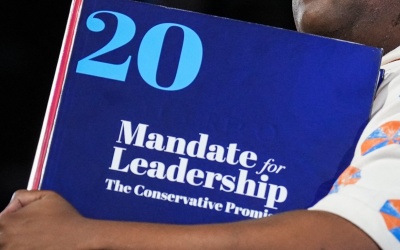
John Ratcliffe, who served as Trump's director of national intelligence during the former president's final months in office, has been chosen to head the CIA for the new Trump administration.
Ratcliffe, another China hawk, is a more traditional choice for the job, in contrast to other figures contending for the position, such as Kash Patel, a former Trump official and close confidant.
He would become the first person to serve as both CIA director and director of national intelligence.
Ratcliffe is a former congressman and also previously served in the Department of Justice, where he was appointed by former President George W Bush in 2004 as chief of anti-terrorism and national security for the eastern district of Texas. This was at the height of the post-9/11 mass surveillance campaign in the US, which targeted Muslim communities.
Patel, a former chief of staff to the secretary of defence under Trump, is likely poised to take on a role in the new Trump administration. Patel is a close confidant of Trump and was at his side during his criminal court case this past year.
Patel has made it clear that he and Trump agree on most national security issues, including eliminating individuals in the national security apparatus deemed disloyal to the president.
He is also one of the few Republicans who has vehemently defended the 6 January riots at the US Capitol, when a large swathe of Trump supporters broke into the US Congress in an attempt to overturn the 2020 election results.
Grenell, Trump's former acting director of national intelligence and his former ambassador to Germany, was initially seen as a dark horse candidate for secretary of state. But with that nod going to Rubio, Grenell could still play a pivotal role in the administration.
Grenell was instrumental in Trump's presidential campaign with his outreach to Muslims and Arabs in the state of Michigan. He campaigned alongside Bishara Bahbah, the chair of Arab Americans for Trump, across Michigan, which has a high concentration of Arab and Muslim Americans.
He previously served in the George W Bush administration, where he was the spokesman for the US ambassador to the UN. According to the State Department, he led communications strategies on "the war on terrorism, peacekeeping operations, the conflict in the Middle East, nuclear proliferation, Israel’s security".
It was during this period that the US used its platform at the UN to promote the idea that Iraq possessed weapons of mass destruction. Former Secretary of State Colin Powell gave a presentation to the world body in 2003, laying out evidence showing Iraq's Saddam Hussein possessed such weapons, which turned out not to exist.
The evidence was later used as justification for the US invasion of Iraq, a conflict that killed at least 200,000 Iraqi civilians.
Robert O'Brien is another contender for a top administration position. He was Trump's fourth and last national security advisor in his first term and he maintains a relationship with the president-elect and several world leaders.
O'Brien met with Israeli Prime Minister Benjamin Netanyahu in May, around the time that US President Joe Biden was pushing for a ceasefire deal that Israel had rejected.
Who will be the US ambassadors and envoys?
Trump's first two diplomatic appointments - the US ambassador to Israel and the US ambassador to the United Nations - potentially give insight into the president-elect's foreign policy priorities.
For US ambassador to Israel, Trump tapped former Arkansas governor Mike Huckabee, a prominent member of the pro-Israel evangelical Christian movement in the US.
Huckabee, who will now be at the centre of US diplomacy with Israel amid its wars on Gaza and Lebanon, has in the past rejected the existence of the Palestinian people.
"Mike has been a great public servant, Governor, and Leader in Faith for many years. He loves Israel, and the people of Israel, and likewise, the people of Israel love him. Mike will work tirelessly to bring about Peace in the Middle East!" Trump said in a statement.
In response to the decision, the pro-Israel Republican Jewish Coalition praised Huckabee as "a long-time friend" and said he has an "abounding love of Israel".
In 2013, Huckabee received the Adelson Defender of Israel award at a Zionist Organization of America dinner.
The former governor also rejected referring to the West Bank as occupied by Israel, instead referring to the Palestinian territories using the Hebrew terms of “Judea and Samaria”. He claimed that all of the occupied West Bank belonged to Israel.
For UN ambassador, Trump chose New York congresswoman, Elise Stefanik.
Stefanik has little foreign policy experience but is a fervent pro-Israel hawk. In December 2023, she raised her political profile by aggressively questioning university presidents for not doing enough to quell pro-Palestine protests on US campuses.
Stefanik, another recipient of the Adelson Defender of Israel award, repeatedly asserted during the hearings that the pro-Palestinian slogans "from the river to the sea" and "globalise the intifada" were tantamount to calls for genocide.
Since the beginning of Israel's war on Gaza, Stefanik has attacked the UN and accused it of antisemitism for its criticism of Israel’s bombardment of Gaza.
Last month, Stefanik called for a "complete reassessment" of US funding for the UN, and she has pushed for blocking Washington's support for the UN agency for Palestinian refugees, known as Unrwa.
In his choice for US special envoy to the Middle East, Trump decided against going with a traditional diplomat and chose Steven Witkoff, a real estate investor with an extensive portfolio in New York. It's unclear what the position of Middle East envoy will be under Witkoff.
Trump's first Middle East envoy, Jason Greenblatt, helped negotiate the Israeli normalisation agreements with the United Arab Emirates, Bahrain, Sudan, and Morocco.
Still, the choice does paint a picture of how Trump will approach his foreign policy in the Middle East. After Trump left office in 2021, his family's company inked several real estate deals in Saudi Arabia, the United Arab Emirates and Oman.
In March, Trump's son-in-law and former senior White House advisor Jared Kushner made international headlines for comments saying that Gaza was valuable "waterfront property" and advocated that Israel "move the people out and then clean it up".
What about the US economy?
Given that Trump's major focus during his election campaign has been the economy, the list of contenders for treasury secretary is long.
One top candidate is Scott Bessent, a key economic advisor to Trump. Bessent has enjoyed a positive relationship with Trump and has spoken favourably about using tariffs as a negotiating tool. Trump has focused on tariffs as a key part of his economic agenda and foreign policy.
Larry Kudlow is a more prominent name amongst other possible options for treasury secretary. A familiar face to many conservative Americans, Kudlow is a network personality with the Fox Business Network and previously served as director of Trump's National Economic Council.
Robert Lighthizer played a crucial role in shaping the former president's economic policy as Trump's trade representative. He is likely to be back in the White House in 2025.
Under Trump, he helped renegotiate the US's free trade agreement with Mexico and Canada, and he was also a leading figure in Trump's trade war with China.
Who is Stephen Miller, architect of the Muslim ban?
Trump's former White House advisor, Stephen Miller, is returning to the Oval Office. This time, he's been tapped as Trump's deputy chief of staff for policy, a role that would give Miller the tools to help shape the administration's immigration policy.
During Trump's first term, Miller was reported to be one of the architects of the original iteration of the Muslim ban, a blanket immigration ban on seven Muslim-majority countries that was widely condemned by civil rights and immigration groups in the US.
The US courts also struck down the ban, which survived only after several different iterations were proposed.
President Joe Biden reversed the ban once he arrived in office in 2021.
Miller also played an instrumental role in Trump's decision to separate thousands of immigrant families during his first term in office.
Who will be education secretary?
While the education secretary might not have any impact on US foreign policy, whoever heads the department could shape the federal government's response to the past year of pro-Palestinian protests taking place on college campuses.
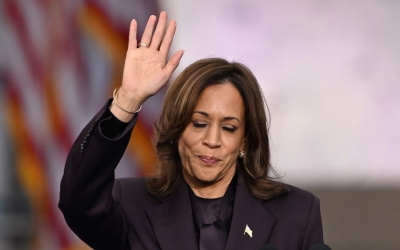
The student protests, which have been calling on their institutions to divest from financial stakes in companies profiting from the Israeli occupation and war on Gaza, have been met with repression by university administrations across the country.
Several university presidents resigned after being brought to Congress and criticised for not doing enough to clamp down on the protests.
Pro-Israel groups have also filed complaints with the US Department of Education's civil rights department, marking a key battleground between pro-Israel, Zionist groups and pro-Palestinian ones.
Some potential names to fill the position include Tiffany Justice, the co-founder of Moms for Liberty, a conservative education organisation, and Virginia Governor Glenn Youngkin.
However, Trump has also advocated for disbanding the entire department, and his former education secretary, Betsy Davos, has shared this sentiment.
Middle East Eye delivers independent and unrivalled coverage and analysis of the Middle East, North Africa and beyond. To learn more about republishing this content and the associated fees, please fill out this form. More about MEE can be found here.


